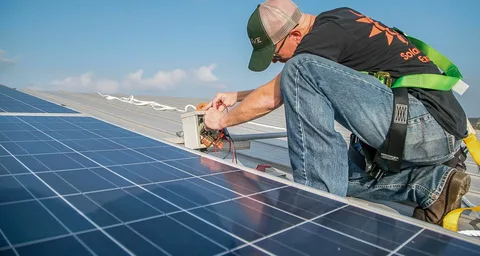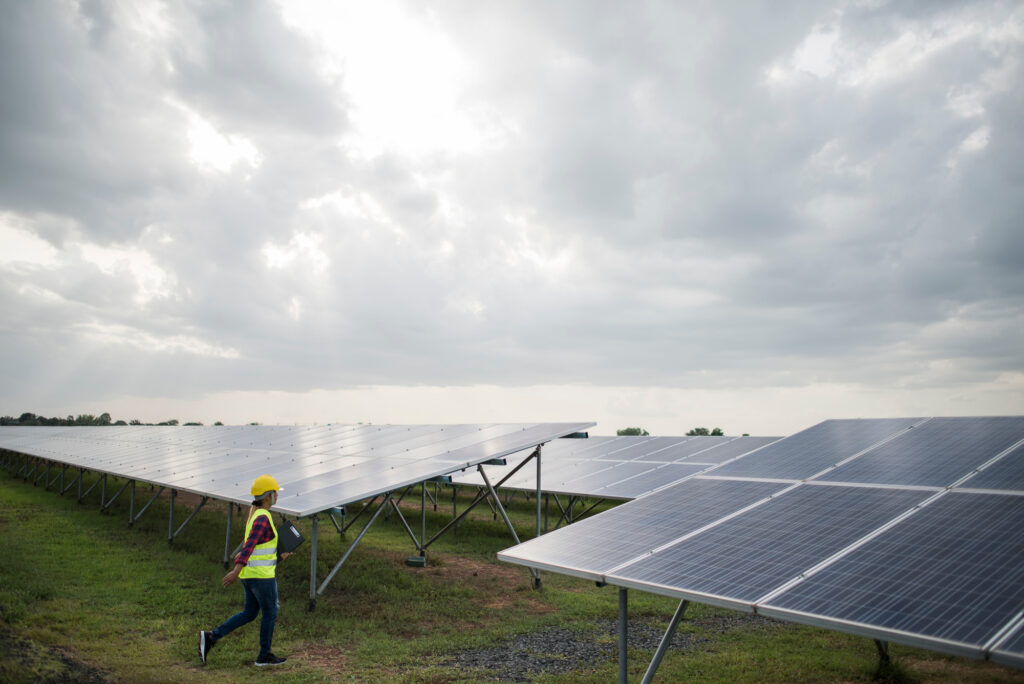The primary advantages and disadvantages of solar energy center on its sustainability versus its cost and intermittency. Advantages include being a renewable, clean supply that reduces electricity bills and carbon footprints. Disadvantages include high initial installation expenses, reliance on weather and sunlight hours, and the need for sizable space and probably high-priced energy storage.
What Are the Advantages and Disadvantages of Solar Energy?
The sun throws more energy onto the Earth in one hour than the entire world consumes in 12 months. Harnessing this power, known as solar power, is key to the global transition in the direction of sustainable living. As more homeowners and businesses are adopting photovoltaic (PV) systems, it’s crucial to understand the complete picture, which includes the solar energy benefits and drawbacks.
Why Solar Energy Matters in Today’s World
The worldwide push to combat climate change and reduce reliance on finite fossil fuels has brought solar power into the limelight. The importance of solar energy lies in its potential to provide an actual, long-term option to electricity security and environmental degradation. It is a vital issue in attaining zero emissions goals and building resilient, decentralized energy grids.
A Quick Look at How Solar Power Works
Solar power systems convert sunlight directly into energy using photovoltaic cells, which are normally grouped into panels. These panels absorb photons, charged electrons, and produce a direct current (DC). An inverter then converts this DC into the alternating current(AC) used to power houses and businesses.
Advantages of Solar Energy
Solar power gives a bundle of advantages for both the environment and the economic system. Here are several key advantages of solar energy:
1. Renewable and Sustainable Energy Source
The sun is an unlimited useful resource. As long as the sun shines, we’ll have access to solar energy, making it a truly renewable and sustainable power source. Unlike coal or natural gas, its supply will not run out.
2. Saves Money on Electricity Bills
One of the most immediate monetary advantages is the reduction, or even elimination, of monthly utility payments. By producing your own electricity, you purchase less from the utility company, and in many regions, net metering allows you to sell excess energy back to the grid, mainly in credits or payments.
3. Low Maintenance and Long Lifespan
Once installed, solar panels are remarkably long-lasting and require little or no maintenance. They don’t have any loose parts, which minimizes wear and tear. Most producers provide warranties of 20 to 25 years, which means your system will generate power for decades with the occasional cleaning.
4. Environmentally Friendly and Reduces Carbon Footprint
Solar energy is a clean form of energy. It produces no greenhouse gases or harmful emissions at any stage in operation, which appreciably reduces your carbon footprint and helps the fight against climate change.
5. Increases Property Value
Studies constantly show that houses that have solar power systems sell faster at a premium price as compared to non-solar houses. It is a modern improvement that signals decreased future electricity costs to potential buyers.
6. Energy Independence and Grid Security
Generating your own energy lessens your dependence on centralized energy grid stations and unstable fuel markets. This move towards electricity independence offers more resilience against grid failures, price spikes, and geopolitical threats.
7 . Supported by means of Government Incentives and Rebates
In many countries, including Canada, the United States, and those in Europe, federal and regional governments offer large tax credits, rebates, or performance-based incentives to decrease the initial cost of installation, considerably improving the return on investment.
8 . Technological Advancements in Solar Panels
The solar industry maintains innovation. Panel efficiency is steadily increasing, and new technologies, such as thin-film and perovskite cells, promise cheaper and lighter installation options in the future.
9. Job Creation and Economic Growth
The rapid expansion of the solar sector creates lots of extremely good jobs in production, sales, installation, maintenance, stimulating local and national economies.
Disadvantages of Solar Energy
Despite the compelling advantages, solar energy isn’t always without any limitations, which specifically relate to installation, electricity storage, and usage dependency.
1. High Upfront Installation Costs
The most significant barrier for many is the high installation charges in advance. A complete residential system can range from thousands to tens of thousands of dollars, depending on size, location, and roof type. While long-term savings often result in the net profit, the initial investment can be prohibitive.
2. Weather and Sunlight Dependency
Solar panels only generate electricity during the daylight hours and are highly influenced by climate. Weather and daylight dependence mean output is significantly affected on cloudy days or during the periods of heavy snow, and ceases completely at night. This intermittency is a major technical challenge.
3. Space Requirements for Panels
To generate enough electricity to power a house or business, solar PV panels require a large, unobstructed surface area, typically south-facing, with a roof dedicated to floor mount. This can be a challenge in densely populated city areas or for homes with limited land.
4. Energy Storage Can Be Expensive
Because production stops at night, electricity must be stored to be used 24/7. An energy storage can be expensive and significantly increase the overall cost of the system. While battery costs are falling, they are still a prime aspect of the investment.
5. Manufacturing and Recycling Challenges
The manufacturing system for solar panels, specifically the processing of silicon, is energy-intensive. Furthermore, at the end of their lifespan, the disposal and recycling challenges for old panels—which contain materials like silicon and aluminum—must be managed to ensure sustainability.
6. Limited Efficiency and Output
Despite improvements, the performance of commercially available solar panels is still noticeably low, usually starting from 15% to 22%. This means that a massive portion of the available solar energy is not converted into usable energy, resulting in limited performance and output.
7. Not Suitable for Every Location or Roof Type
Some properties, because of heavy shading, unsuitable roof angles, or historical building regulations, are not eligible for solar system installation. This limits the universal applicability of rooftop PV systems.
8. Maintenance in Dusty or Polluted Areas
While maintenance is typically low, panels in areas susceptible to dust, heavy pollution, or excessive bird droppings can go through large drops in performance (as much as 30% in dusty regions). Regular cleaning is needed in these areas.
Comparison: Advantages vs. Disadvantages of Solar Energy
A side-by-side view allows for a quick assessment of the advantages and disadvantages of solar energy
| Advantages (Pros) | Disadvantages (Cons) |
| Renewable and sustainable | High upfront installation costs |
| Reduces electricity bills | Weather and sunlight dependency |
| Low maintenance, long lifespan | Large space requirement |
| Environmentally friendly (zero emissions) | Expensive energy storage (batteries) |
| Increases property value | Limited efficiency and output |
| Supports energy independence | Manufacturing and recycling waste |
| Government incentives available | Not suitable for every roof/location |
Key Takeaways for Homeowners and Businesses
For most users, the long-term financial and environmental advantages of solar energy outweigh the initial hurdles. Businesses, especially, benefit from constant energy rates and high-quality public relations related to innovative initiatives. Homeowners have to make sure their properties are suitable and calculate the payback period (the time it takes for financial savings to offset the initial cost) to affirm economic viability.
The Importance of Solar Energy for the Future
1. Role in Reducing Climate Change
Solar power’s most profound effect is its role in reducing greenhouse gas emissions. By replacing fossil fuel generation, it directly cuts millions of tons of carbon dioxide and other harmful pollutants from the ecosystem, supporting the world in meeting important environmental benchmarks.
2. Supporting Energy Independence and Sustainability Goals
For nations and individual purchasers, a sturdy solar sector provides protection against risky global energy rates. It underpins sustainability goals by making sure a continuous, clean supply of power for future generations.
3. How Solar Energy Encourages Innovation and Green Jobs
The boom of solar drives scientific research into better efficiency, smarter grid control, and less expensive storage solutions. This innovation fosters new industries and green jobs, transforming the economic landscape globally.
Is Solar Energy Right for You?
Factors to Consider Before Installation
Before making a decision, ask yourself:
-Does my roof get enough hours of unobstructed daylight every day?
-Is my roof structurally sound, and does it have at least 10-15 years of life left?
-What local, provincial, or federal government incentives can I get to lower the initial cost?
Estimating Solar Costs and Payback Period
A solar installer will calculate your average energy utilization, determine the dimensions of the system you need, and offer a complete cost breakdown. They will use these statistics to estimate your payback period, which usually ranges from 6 to 10 years, depending on your area and electricity rates.
Tips for Maximizing Solar Efficiency
-Keep panels free from dirt, leaves, and snow.
-Ensure panels are set up at the optimal angle to your latitude.
-Use the system’s monitoring software program to detect any drops in output early.
Conclusion
The evolution of solar technology is one of the most interesting developments in modern power. While solar energy advantages and disadvantages should be carefully weighed, particularly the high initial investment against the enduring benefits of free, clean energy, the overall trajectory is clear. Solar energy gives a pathway to a more resilient, sustainable, and economically sound electricity future.
Are you geared up to explore the specific cost and savings a solar system can bring to your house? Contact us at RAR Energy now to schedule a free consultation and know your specific ROI.






